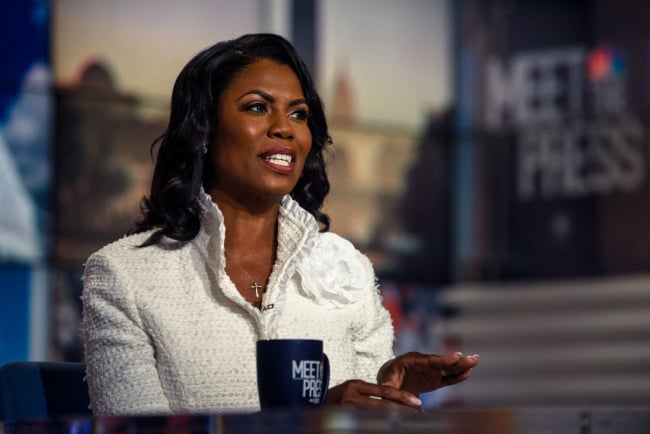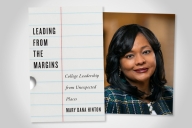You have /5 articles left.
Sign up for a free account or log in.

Omarosa Manigault Newman
Getty Images
In her just-released White House memoir, Omarosa Manigault Newman paints herself as the biggest champion of historically black colleges in the Trump administration.
But that cause wasn’t backed by everyone on Trump’s team, according to her telling. And her chief nemesis in that mission was none other than Education Secretary Betsy DeVos.
Manigault Newman, a longtime confidante of President Trump and graduate of two HBCUs, served as director of communications for the White House Office of Public Liaison until a messy departure in December. Since then, she’s criticized the president and the administration in a series of TV appearances in the run-up to the release of her memoir, Unhinged: An Insider's Account of the Trump White House.
She’s called Trump a racist and writes in the book that he frequently undermined her careful planning and preparation with thoughtless gaffes. But DeVos, whom she calls "woefully inadequate and not equipped for her job," emerges as her real adversary in her quest to promote HBCUs. The Trump administration, for its part, is denying the claims in the book.
The Trump White House is historically unpopular among African Americans but made it a point early on to court historically black colleges, partly at the urging of Manigault Newman, who earned degrees at Central State University and Howard University. Some HBCU leaders were still angry over their dealings with the Obama administration and ready to turn the page with a new president, even one with a toxic brand among many of their supporters. But the efforts of administration officials to build a rapport were damaged early on by verbal and visual missteps.
Trump, in a breakfast marking the start of Black History Month last year, displayed a stunning ignorance of Frederick Douglass, the 19th-century abolitionist. And weeks later DeVos referred to black colleges as "pioneers of school choice," a phrase that drew immediate criticism as tone-deaf and ill informed. As black college leaders pointed out, HBCUs were established because, for decades, segregationist policies shut black students out of other higher ed institutions.
But Manigault Newman felt personally sabotaged by the fallout from the now infamous visit of black college presidents to the Oval Office last year, describing the incident as being “tackled by my own teammate at the one-yard line.”
In the lead-up to President Trump’s signing of an executive order moving the White House Initiative on HBCUs from the Education Department to the executive offices, a group of presidents from black colleges was invited to the Oval Office for a brief meeting and photo op. That visit soon became best known for an image of Kellyanne Conway kneeling on a couch with her shoes off while the college presidents posed with Trump several feet away. (Conway had been standing on the couch to take a photo before that moment.)
"The next day the headline was about Kellyanne barefoot in the Oval and not about the historic meeting with HBCU presidents in the Oval Office. It was historic because in his eight years in office Obama had never invited all the presidents to the White House. But that point was lost because of Kellyanne," Manigault Newman writes.
Later, she complains, she was forced to fall on her sword and take responsibility for the offensive image that had gone viral after the meeting.
Just as Manigault Newman takes credit for organizing the White House meeting, she says she was the driving force in the administration behind the restoration of year-round Pell Grants, a policy change that will benefit many low-income students of color. Manigault Newman went directly to the director of the Office of Management and Budget, Mick Mulvaney, she writes, to push for the change. (The reinstatement of year-round Pell had long had bipartisan support in Congress and was included in a budget deal last year.)
Where Manigault Newman was on a mission for increased funding for HBCUs, she says DeVos has a different agenda -- one she thinks student protesters just don’t understand.
With many still upset by her comments linking black colleges to school choice, DeVos was booed last year throughout a 20-minute commencement address at Bethune-Cookman University, a historically black college in Daytona Beach, Fla. But she was unfazed by the reaction, Manigault Newman says.
“She said, ‘They don’t get it. They don’t have the capacity to understand what we’re trying to accomplish.’ Meaning, all those black students were too stupid to understand her agenda. I said, ‘Oh, no, Madam Secretary. They get it. They get it, and they aren’t happy about you or your goals.’”
Manigault Newman says the DeVos agenda, “in a nutshell, is to replace public education with for-profit schools. She believes it would be better for students, but the truth is, it's about profit. She's so fixated on her agenda, she can't give any consideration to building our public schools, providing financing for them, particularly their infrastructure needs.”
When Manigault Newman later reported to Trump that she was left behind at her hotel by the DeVos team on that trip, she claims the president referred to his education secretary as “Ditzy DeVos” and promised to push her out soon.
The Education Department didn't respond to requests for comment, but Liz Hill, a spokeswoman for DeVos, told Politico this week that Manigault Newman is "a disgraced former White House employee … peddling lies for profit. The book is a joke, as are the false claims she’s making about Secretary DeVos."
Manigault Newman also says DeVos was behind efforts to cancel the White House HBCU Summit last year. Some members of Congress and college leaders had called for the event to be postponed -- many of them disturbed and angered by Trump’s response to white supremacist violence in Charlottesville, Va., in which one neo-Nazi drove his car into a crowd of protesters, killing activist Heather Heyer. Trump had equivocated over who was responsible for the violence, saying there were “good people” on both sides of the protests.
Despite skepticism from allies in the HBCU sector, Manigault Newman insisted the summit should go on as planned. But DeVos was the biggest voice within the administration pushing for the event’s cancellation, she claims. Manigault Newman writes that she convinced White House chief of staff John Kelly to let the event go on over DeVos’s objections, although the summit was eventually pushed back until later in the fall.
“I heard from a member of the HBCU staff that DeVos was livid that the event was moving forward,” she said.
Manigault Newman claims DeVos attempted to shut down the event by announcing that it was off and then canceling the conference hotel, costing the federal government $75,000. She arranged to hold a scaled-down event at the White House instead.
The alleged foot dragging by DeVos included refusing to give opening remarks to the new class of HBCU all-stars, a group of undergraduate and graduate students selected each year to act as ambassadors of the White House initiative on black colleges. But Bill McGinley, the head of cabinet affairs, told DeVos she had to give the remarks, according to Manigault Newman.
"To the dismay of all the forces working against me, I had one person in my corner -- President Trump," she writes.
It was one of the few unambiguous high points for Manigault Newman in her White House tenure since Trump’s inauguration parade. Before the festivities, she helped secure the funding for the Talladega College marching band to attend and participate. That decision drew serious blowback for the school, but Manigault Newman appeared on Fox News to promote a GoFundMe fund-raiser for the band that eventually raised more than $600,000.
“I was cheering and filled with pride for them. Every one of those students was like me,” she writes, reflecting on the parade. “They’d gone to an HBCU for experience and opportunities and because of our efforts, they were here, and standing tall. I was just so proud of their determination and resilience. Despite all the protests and forces working against their coming to D.C., they’d made it. And now the eyes of the world were on them.”








